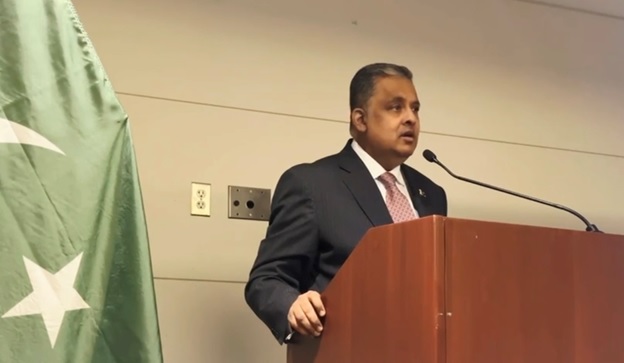
Amb Rizwan Saeed Sheikh Showcases Pakistan’s “Addictive” Profitability to US Partners
By Elaine Pasquini

Washington, DC: Addressing American business leaders, policymakers and diplomats on May 29, 2025, at the World Trade Center in Washington, DC, Rizwan Saeed Sheikh, Ambassador of Pakistan to the United States, highlighted the economic opportunities and “addictive” profitability of the Pakistani market. The success of over 80 US multinational companies in Pakistan for the past several decades, he said, clearly reflects the country’s profitability and potential as a regional trade hub.
Pakistan’s booming IT sector, driven by its tech-savvy youth, is creating an unmatched complementarity with the United States, Ambassador Sheikh said. “From a futuristic standpoint, this unique complementarity between two mega countries in the world deserves focused attention, strategic recognition and concrete action.”
Reflecting on the recent escalation between Pakistan and India, the ambassador stressed that Pakistan does not seek conflict and values peace above all.
“While there is a sense of national pride over the success in thwarting aggression, we don’t want to do it again,” he stated. “We are a peace-loving country. At the very time this escalation took place, we were in the middle of a positive economic trajectory.”
Discussing Pakistan’s trade deficit with the United States in view of the longstanding political and economic relations between the two countries, the ambassador pointed out that that Pakistan ranked 33rd in terms of trade deficit with the United States – a modest figure of $3.1 to $3.4 billion. “This is a manageable gap that can be bridged through increased imports, such as US cotton and soybeans,” he said. “Pakistan is already one of the largest importers of American cotton, a key input for our thriving textile industry.”
Ambassador Sheikh also noted that discussions are ongoing with US agricultural councils, including the US Soybean Export Council and Cotton Council, to deepen agricultural trade ties.
In addition, the ambassador highlighted the extraordinary potential for collaboration in the technology sector, underpinned by Pakistan’s youthful demographic, noting 65 percent of the population is under age 30. Pakistan offers a 70 percent cost advantage in IT services compared to the US and 20-30 percent to any of its global competitors. “We are not only cost-effective but also quality-competitive, as demonstrated in some of the world’s most demanding technological arenas as exemplified by the high-tech and singularly successful aerial combat on the night between the 6th and 7th of May,” he said.
Noting the recent investments by Canadian mining company Barrick Gold in Pakistan’s copper reserves and the interest expressed by US investors in the mineral wealth of the country, the ambassador stated that Pakistan could be the next Saudi Arabia of copper.
“Pakistan intends to tokenize and digitize its mineral assets,” creating new avenues for US fintech investment and collaboration, he added.
Drawing a powerful parallel with Mexico’s role for the US, the ambassador described Pakistan as a connector country in South and Central Asia, uniquely positioned to facilitate trade between the US, China and the broader region.
The ambassador also noted the important role of the one million strong Pakistani-American diaspora in strengthening bilateral ties and people-to-people contacts. “Our diaspora has done exceptionally well and can be a powerful force multiplier in amplifying and facilitating US-Pakistan economic engagement,” he said.
In conclusion, Ambassador Sheikh invited US corporations, entrepreneurs, state government officials and economic stakeholders to explore the vast market that Pakistan offers, being a country of 250 million, and to take advantage of its many economic opportunities.
(Elaine Pasquini is a freelance journalist. Her reports appear in the Washington Report on Middle East Affairs and Nuze.Ink.)

